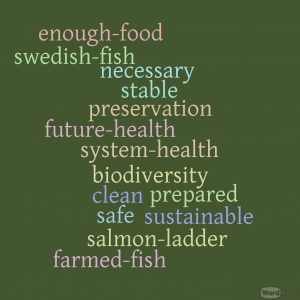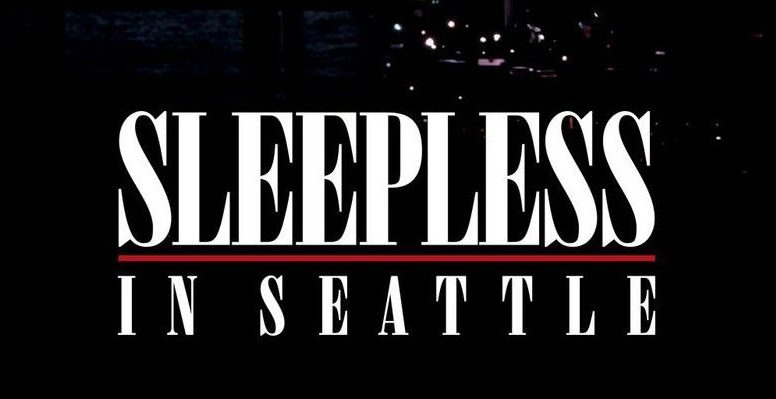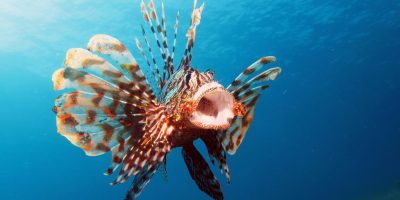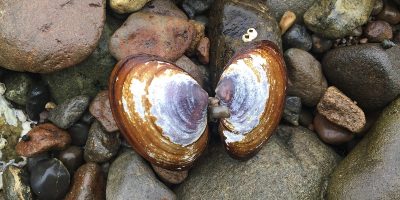Perhaps people that have no idea what’s going on with science would prefer it stays that way. Despite the mass of scientific research happening in aquatic and fishery science, most of the general public is totally unaware of the environmental problems and curiosities that spark our research, and often don’t understand why we should (and do) conduct our studies.
In this “ignorance is bliss” scenario, communication efforts by scientists may be a misuse of time. However, I think that for people who are just “sleeping” on some big environmental issues, they may become more engaged if scientists expanded their bubbles. This bubble exists both within the science community as a whole (versus non-science fields), and even within field or topic-specific research disciplines such as fisheries (versus other areas of aquatic research).

Responses of interviewees (n=10) when asked “What do you think about when you hear ‘sustainable fisheries’”?
As a fisheries undergraduate at UW, I’ve realized the importance of communication with non-scientists and the general public. It is evident every time I leave the Fishery Sciences Building and talk with other students on campus, most of whom say “oh, so what do you do?” when I tell them about my major. Further responses to my explanations of class topics and research projects often include a “huh…” or an occasional “interesting,” but go unprovoked by further inquisition.
Science communication has been a hot topic for years, and many researchers are “sleepless” over how to effectively communicate their work to non-scientists and scientists outside of their field. Until the scientist bubble is successfully expanded – or even popped – scientists should be tossing and turning.
What is the public’s understanding and interest in science?
I think the first step in targeting science communication to the public is gauging the public’s understanding and interest in science. Since the focus of my studies is aquatic and fishery science, I used this as a general topic for interviews I conducted with members of the general public. Below are responses from two anonymous interviewees (identified as I1 and I2) that consented to their answers being published.
Non-scientist answers to questions about science
Do you know what ocean acidification is–and if so, what have you heard?
I1: Is it something that happens from pollution? I imagine it’s from the chemicals that we use in daily products that messes with the ocean’s acidity or pH? Global warming? [Sub question for I1: What do you think the problems are, if any? What is affected?] It changes ocean ecology and the way fish have adapted to current pH, I imagine it would be hard for them so some might die if they’re not as strong, some may be toxic to eat. Not just fish, probably everything that lives in the ocean–crabs, shells that have living things in them, and maybe plants.
I2: Is that what bleaches the coral? All the corals dying, the Great Barrier Reef is something like 1/3 of the size it used to be.
What is your opinion on sustainable fisheries? Do you care?
I1: Yes I do care. Taking all the fish from one spot and killing off their ecosystem is bad.
I2: I care and I don’t like to see here where the Atlantic salmon were being grown and got loose. I don’t like to see them shutting down hydroelectric dams for fish. You’ve got your sports fishermen and commercial fishermen, so there needs to be a balance and we need to quit trashing our oceans. You should see how much plastic there is.
Do you eat farmed fish? Why or why not?
I1: I think it’s really unhealthy for the fish and forces them to be in unhealthy conditions. I guess I don’t really care about the quality of their lives, but I still think it’s unfair to the fish.
I2: Not anymore. I didn’t used to know the difference. It usually doesn’t taste as good and they’re living in filthy conditions, swimming in their own [feces]. Atlantic salmon should not be farmed here, they get out and contaminate the healthy salmon.
How can science articles be improved so that they are easier to understand?
I1: Having issues that the general public actually cares about and particularly relating it to how it would affect them, and specifically explaining any of the confusing science words or any processes used while collecting data.
I2: Less technical language and I guess kinda connecting with the average person who doesn’t have any real knowledge in the area, you gotta find something to connect with people on. Like everybody thinks ‘yeah we need to save our oceans, Puget sound, etc’, but no one really knows anything about it. And I do read some scientific articles but most of them go over my head and there’s so much crappy fake news out there, you don’t know what to believe. [Sub Question for I2: Do you believe what you read in scientific articles?] I get my news online and most of it is directed at getting clicks/shares, not factual. It’s entertainment. If you’re not well versed in science world, how do you know if a paper is legit? If there’s no political agenda behind it, I’ll believe it. Especially if they use funding for the benefit of a political party or corporation.
Would you care to learn more about what’s going on with fish populations and climate change?
I1: No, I think I know as much as I want to know.
I2: I don’t eat a lot of fish so I care a little less, but I want to see fish survive and be healthy in the wild and I know it’s the whole ecosystem, so commercial fisheries need to be managed.
What do you think fisheries scientists should be studying?
I1: I don’t know, salmon?
I2: How to protect the wild ecosystems and provide for peoples’ needs, like sportsmen and food consumption. I know a lot of people who hunt or fish and they really enjoy it and have done it for centuries. I don’t want to see them stop but I understand rivers need to be healthy and provide food to people. Unless the ocean is healthy, people aren’t going to be healthy. It’s bad for everyone. There’s gotta be a way to turn back the clock on some stuff like plastic water bottles.
Do you think scientists are in a “bubble,” and does this impact you? How so? Is science communicated to the public enough?
I1: I think people write papers to show other scientists their work, and it’s the charge of public agencies to actually display that information to the public.
I2: I don’t know enough scientists to really answer that. Your above-average intelligence person can understand the science that’s out there, but below that people are less able to understand. As you go down in intelligence, you go down in money you earn but you’re working really hard to provide, so you don’t have time to care about science.
Scientists are more concerned with doing research than they are with getting people to understand. -Interviewee 2
Surprises during the interviews
I interviewed people with varying backgrounds and exposure to science, and used their responses to illustrate my point that people are largely unaware of what scientists do and why. However, to my delight (as an optimist), many responses showed deep care and respect for our environment and interest in scientific issues.
Surprisingly, some people care about specific environmental issues that they know relatively little about, such as farmed fish and other hot topics. Some people even brought up other topics to talk about like “tell me about coral reefs dying…” which sparked new and exciting conversations with non-scientists.
This interest, however, is often clouded by a lack of full understanding. This is where we (the scientists) come in!
For people that care about aquatic issues or are at least somewhat interested in related research topics, my interviews demonstrate that it is important that scientists provide accessible and understandable information about past, ongoing, and future research. This will ultimately improve the public perception, understanding, awareness and support for our research.
References:
Weigold MF. Communicating science: A review of the literature. Science communication. 2001 Dec;23(2):164-93.






Leave a Reply